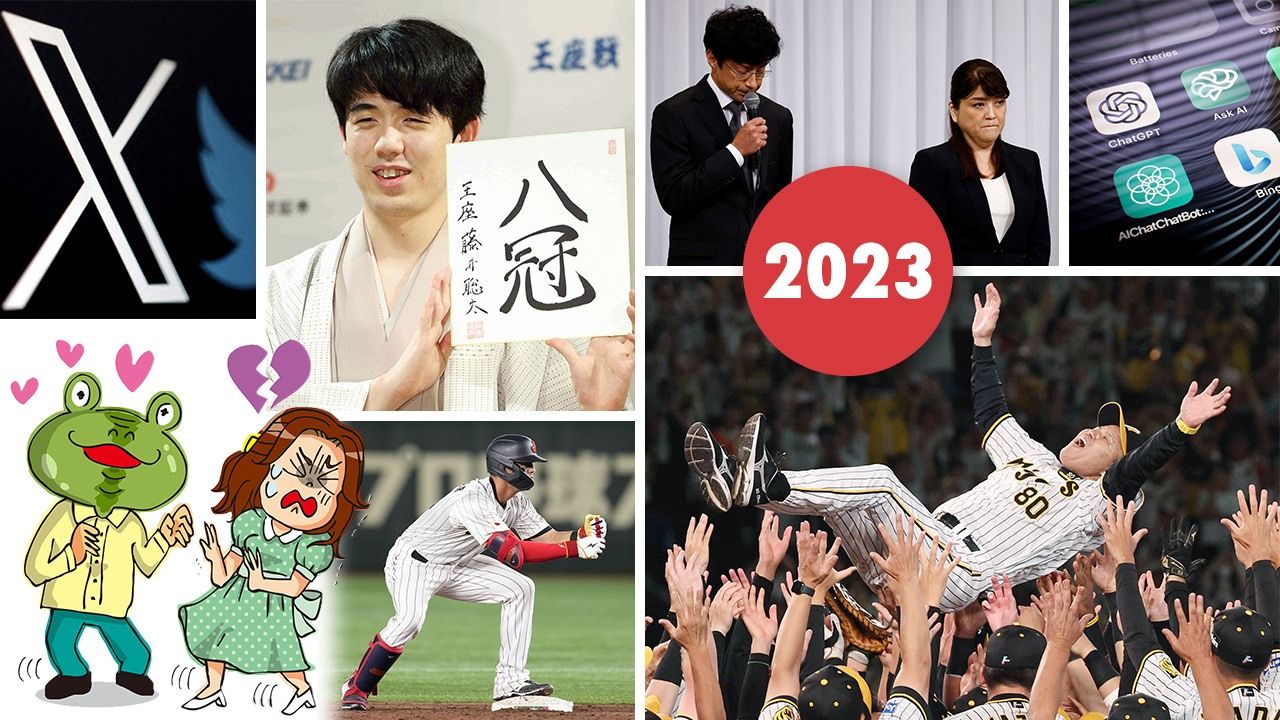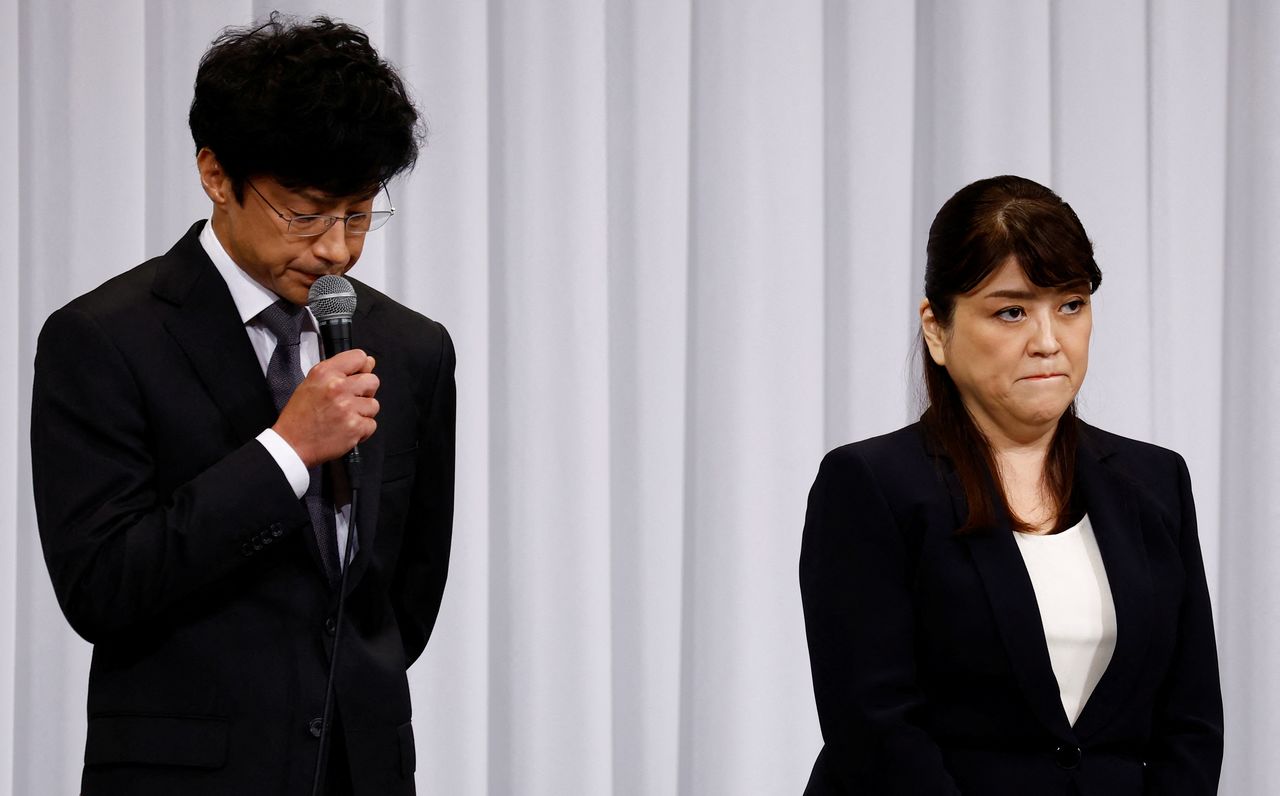
Competitive Sports, Crime, and Climate Change: Japan’s Words of the Year for 2023
Culture Language- English
- 日本語
- 简体字
- 繁體字
- Français
- Español
- العربية
- Русский
The Terms Defining the Times
Each year Jiyū Kokumin Sha announces its nominees for the words or phrases of the year. The publisher, known for its Gendai yōgo no kiso chishiki (Basic Knowledge on Contemporary Terminology), an annual guide to the latest terms in use in Japanese, tracks changes in and updates to the language, picking a set of these each autumn. On November 2 the company released its list of 30 terms that were on the nation’s lips over the course of 2023.
The COVID-19 pandemic is receiving less attention than it has in previous years, but it still inspired additions to the list, including “category 5,” to which the SARS-CoV-2 virus was downgraded, and “after four years” of restrictions on public gatherings, people were able to gather for major sporting and other events as they once did. Tangentially related was the term “overtourism,” which came up once again as the number of tourists, both domestic and foreign, came roaring back to approach prepandemic levels in many areas.
Baseball provided some of the nominees, including “that thing,” the phrase used by Hanshin Tigers manager Okada Akinobu to refer to the league championship his team was chasing, and the “peppermill” performance displayed by Lars Nootbaar and his teammates on the Samurai Japan team that won the World Baseball Classic title for Japan.
On the darker side of language, terms describing increasingly catastrophic climate change and crimes like sexual abuse made it to the list as well.
Below we give the complete list of nominees with explanations of their meaning and usage. On December 1, the list will be narrowed down to a top 10 for the year, and the annual winners of the Words of the Year in Japanese will be announced.
Nominees for the Words of 2023
アイム・ウェアリング・パンツ! — I’m wearing pants! Something of a one-trick pony on Japanese TV, the comedian Tonikaku Akarui Yasumura took his “Don’t worry, I have underpants on!” act—in which he strikes poses that make him appear nude, before smiling and announcing his signature phrase—to the global stage, appearing on Britain’s Got Talent almost a decade after first appearing in Japan’s Words of the Year in 2015.
憧れるのをやめましょう — Akogareru no o yamemashō. Before the final game in the World Baseball Classic, pitting Samurai Japan against a formidable Team USA, Japan captain Ohtani Shōhei exhorted his teammates to “stop looking up to these guys” they were about to play. With confidence in their own abilities, they should be able to take on the best and become number one in the world—which they went on to do in their 3–2 win on March 21, 2023.
新しい学校のリーダーズ/首振りダンス — Atarashii gakkō no rīdāzu/Kubifuri dansu. The musical group Atarashii Gakkō no Leaders, four young women dressed in school uniforms, styled themselves as the “representatives of Japanese youth” this year. In the music video for the 2023 “Otona Blue,” the Atarashii Gakkō members display the “head-bobbing dance” move that earned them significant fame on TikTok and helped catapult them to domestic fame after they had already made a splash in international markets.
新しい戦前 — Atarashii senzen. At the end of 2022, Tamori (the entertainer Morita Kazuyoshi) appeared on Kuroyanagi Tetsuko’s popular talk show, where he darkly predicted that the world was heading into a “new prewar era.” The ongoing war in Ukraine and the fresh conflict in the Middle East have many thinking he was onto something with this statement.
アレ — Are; ARE. This slogan for the Hanshin Tigers this season came from manager Okada Akinobu, who took the team to its first Central League title in 18 years. The letters stand for “Aim, Respect, and Empower,” terms meant to propel the team toward greatness, but also form the Japanese term are (“that thing”), which Okada used in place of “the league championship” in pep talks to keep players’ minds on the immediate task at hand.
頂き女子 — Itadaki joshi. These “it’s all mine girls” are said to target older, financially stable men, finding them via social media and dating or having sex with them in exchange for financial support; they then take things a step further, claiming that they are in financial trouble, such as being unable to pay their rent, to extract still higher payments from their marks.
X. Elon Musk’s purchase of the Twitter social media site and his change of its name to X had many writers in Japan scratching their heads about how to refer to it thereafter; appending a parenthetical 旧ツイッター (kyū Tsuittā, “formerly Twitter”) rapidly became one preferred epithet. Musk’s chaotic takeover and follow-up rule changes have prompted many users to start looking for alternative online homes, including the Facebook sister site Threads and Bluesky, launched by the same team that created Twitter originally.
エッフェル姉さん — Efferu nēsan. The “Eiffel girls” included Matsukawa Rui, a Liberal Democratic Party member in the House of Councillors who visited Paris on a research trip in late July and gained unwanted fame for a playful photo taken in front of the Eiffel Tower. The three LDP women in the photo were blasted for taking an unserious tour on the public dime, and Matsukawa stepped down from her position as head of the party’s Women’s Affairs Division.
NGリスト/ジャニーズ問題 — NG risuto/Janīzu mondai. The “NG list,” a selection of “no go” journalists who were not to be called on at an October 2, 2023, Johnny and Associates press conference to discuss its measures in response to the “Johnny’s problem,” the scandal involving company founder Johnny Kitagawa’s alleged sexual abuse of underage boys seeking fame through his talent agency. The exposure of this blacklist added fuel to the fire of the scandal, which was already directing a spotlight on the complicity of the media in keeping a lid on the sordid deeds involved.

Higashiyama Noriyuki, at left, the new president of Smile Up, and Julie Fujishima, former president of Johnny’s and Associates, at a press conference on September 7, 2023. (© Reuters/Kim Kyung-Hoon)
オーバーツーリズム — Ōbātsūrizumu. “Overtourism” was a serious issue in particularly popular parts of the country before COVID-19 struck. Following a brief respite provided by the pandemic’s restrictions on tourist travel, it is now back in force as crowds of visitors clog key destinations, and the roads and railways that get them there, prompting many to consider the appropriate level of popularity for local attractions.
推しの子/アイドル — Oshi no Ko/Aidoru. A new anime adaptation for popular idol manga series Oshi no Ko got fans excited, and its opening theme “Aidoru” (“Idol”) by Yoasobi has had millions of YouTube plays.
OSO18/アーバンベア — OSO18/Āban bea. A male brown bear codenamed OSO18 was responsible for attacks on 66 cattle in Hokkaidō from 2019 to June 2023, when it was shot to death. The elusive aggressor was even hard to capture on video for most of that period. Meanwhile, the increasing appearances of the animals in built-up areas has led to more use of the term “urban bears.”
蛙化現象 — Kaeruka genshō. The “turning into a frog phenomenon” is a phrase that originated in a psychology paper, detailing how a long-term romantic crush can suddenly cool off the moment the other shows an interest. It is a negative play on the happy transformation seen in the fairy tale “The Frog Prince.” In a twist on the original meaning, the phrase took off this year among young people to describe how, for example, minor quirks of behavior in a partner can lead to an instant loss of attraction.
5類 — 5 rui. On May 8, 2023, the government downgraded COVID-19 from category 2 to “category 5” under Japanese legislation, placing it at the same level as seasonal influenza. While infections continue, society has largely returned to normal.
10円パン — 10-en pan. Popular with young Japanese, “¥10 bread” is bread in the shape of a ¥10 coin that is packed with cheese or other fillings. It sells for about ¥500, and was inspired by South Korea’s hit 10-won bread.
スエコザサ — Suekozasa. Toward the end of the NHK morning drama Ranman, a fictional story based on the life of the botanist Makino Tomitarō, the lead character gives the name suekozasa to a kind of sasa or bamboo grass in tribute to his wife (called Sueko in the series, based on the real-life Sue), who had passed away. He adds the plant to the last page of his book, which he promised his wife he would complete, moving audiences across Japan.
性加害 — Seikagai. “Sexual abuse” hit the headlines in 2023 as a BBC documentary put the spotlight on actions by Johnny Kitagawa, founder of the powerful talent agency Johnny and Associates, and Gonoi Rina made public a sexual assault against her while serving in the Self-Defense Forces. Her action in speaking up about sexual violence led to her selection in the Time Next 100 list for 2023, and encouraged others to describe their own experiences, breaking long-standing taboos about open discussion of such matters.
生成AI — Seisei AI. This year saw the release of a succession of tools that can create, for example, text and images based on learning from models. This “generative AI” sparked much talk in Japan, as elsewhere in the world.
地球沸騰化 — Chikyū futtōka. This term, meaning “global boiling,” comes from a speech by UN Secretary General Antonio Guterres. Referring to forecasts that July 2023 was set to break global heat records, he stated that “The era of global warming has ended; the era of global boiling has arrived.”
チャットGPT — Chatto GPT. The best known of the new generative AI tools, “ChatGPT” is a chatbot launched for public use by Open AI in November 2022 that made waves this year. Some prefectural governments have already adopted it for use.
電動キックボード — Dendō kikkubōdo. Electric kick scooters have become common sights on roads in major Japanese cities. The government in July relaxed regulations for the vehicles, allowing them to be used without a driver’s license by anyone 16 or older. Riders are limited to a maximum speed of 20 kilometers per hour and must comply with the same traffic rules as bicycles, but a sharp uptick in traffic violations shows that not all riders follow the rules.
2024年問題/ライドシェア — 2024 nen mondai/Raidoshea. The “2024 problem” poses a serious threat to the already worker-strapped auto transportation industry as labor reforms slated to go into effect that year will limit working hours of drivers, including restricting overtime. Some have championed ride sharing, the second phrase of the entry, as a means of countering the shortage of taxi drivers, an idea that remains unpopular in many circles.
ひき⾁です/ちょんまげ⼩僧 — Hikiniku desu/Chonmage kozō. The catchphrase “I’m ground meat” coined by a member of Chonmage Kozō, a YouTuber group consisting of junior high school students, struck a chord with users on TikTok, as did the corresponding pose.
藤井⼋冠 — Fujii hakkan. Shōgi prodigy Fujii Sōta claimed his “eighth crown” by winning the Ōza tournament in October, making him the first player ever to hold all eight professional titles. The feat came in an already record-breaking year for Fujii, who also became the youngest player to win the Meijin title at 20 years and 10 months.
ペッパーミル・パフォーマンス/ラーズ・ヌートバー — Peppāmiru pafōmansu/Rāzu Nūtobā. Lars Nootbaar thrilled Japanese baseball fans with his play in the World Baseball Classic. The St. Louis Cardinals outfielder, whose mother is Japanese, helped Samurai Japan claim its third WBC title, with his trademark pepper-mill performance becoming the go-to celebration when the Japanese lineup was grinding out hits.

Lars Nootbaar celebrates a base hit with the peppermill performance on March 11, 2023. (© Kyōdō)
別班/VIVANT(ヴィヴァン) — Beppan/Vivant. The television mystery series Vivant broadcast on TBS was a breakout hit, thrilling viewers with the revelation of a secret unit of the Japanese Self-Defense Forces called Beppan.
観る将 — Miru shō. This term combines the verb “to watch” with the first kanji in the word shōgi and describes fans who, drawn by the exploits of Fujii Sōta, enjoy viewing matches but do not necessarily play the game themselves.
闇バイト — Yami baito. These “dark part-time jobs” have garnered the attention of authorities and the public following a spate of shocking robberies and other crimes. Criminal groups have turned to recruiting on the internet and through social media, casually drawing young people with promises of lucrative, short-term jobs that turn out to involve crimes, such as robbery or fraud.
4年ぶり/声出し応援 — 4 nen buri/Koedashi ōen. Following the lowering of COVID-19 restrictions, many festivals, fireworks shows, and other annual events resumed “after four years” of being put on hold. Sports fans were especially thrilled as leagues allowed spectators at stadiums to once again chant and “cheer aloud” at the top of their voices.
Y2K. The gaudy pop culture of the early 2000s came roaring back as younger Japanese embraced Y2K fashion.
(Originally written in English. Banner image, clockwise from top left: the X [formerly Twitter] logo, © Reuters; shōgi phenom Fujii Sōta, © Jiji; Smile-Up [previously Johnny and Associates] President Higashiyama Noriyuki and former President Julie Fujishima, © Reuters; AI apps a common sight on devices today, © Reuters; Hanshin Tigers manager Okada Akinobu lofted by his team after its league championship, © Jiji; Lars Nootbaar displays the peppermill after getting a base hit for Samurai Japan, © Kyōdō; “turning into a frog” illustrated, © Pixta.)